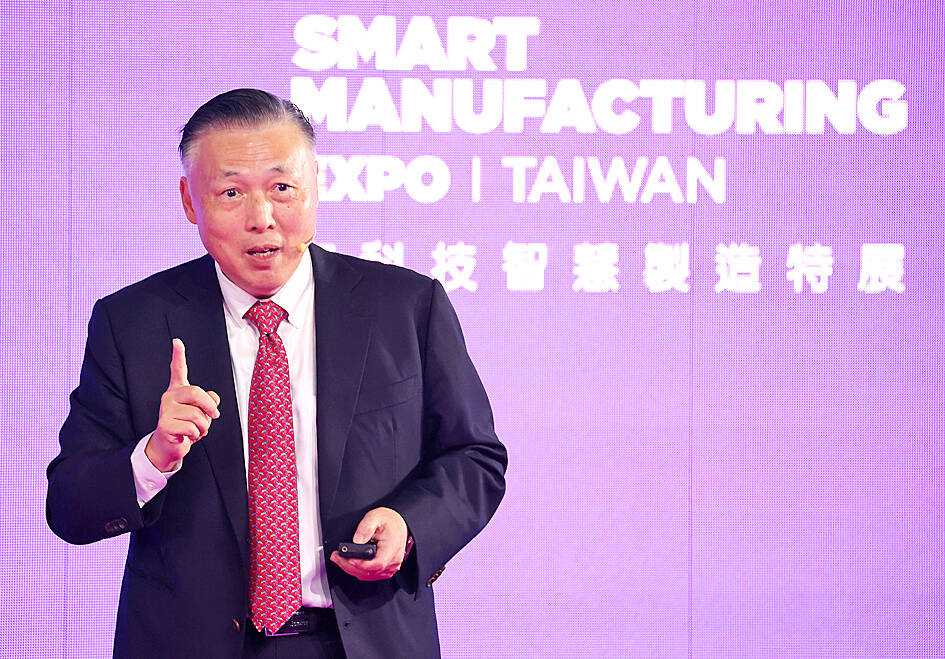ASE Technology Holding Co (ASE, 日月光投控), the world’s biggest chip packaging and testing service provider, yesterday said that revenue would return to growth this year, bolstered by restocking demand.
The company expects annual revenue growth to rise by as much as 10 percent, in line with the global semiconductor industry’s recovery.
ASE said it is on track to double its leading-edge packaging revenue to about US$250 million this year.

Photo: CNA
The growth momentum would last through the next few years, it added.
ASE has also been working with a leading foundry supplier on advanced “chip-on-wafer-on-substrate (CoWoS)” packaging technology, it said.
“2024 will be a year of recovery. We will be coming out of inventory adjustment in the first half. We expect growth to accelerate in the second half,” ASE chief operating officer Tien Wu (吳田玉) told investors during a videoconference.
This year, the company’s assembly and test manufacturing (ATM) revenue would grow “at a similar rate with the [global] logic semiconductor market,” Wu said.
SEMI and analysts expect the global semiconductor market to grow between 6 and 10 percent annually, he said.
Robust smartphone sales in China over the past few months indicate that the semiconductor industry is either at the beginning of an upcycle, or the tail end of a prolonged inventory adjustment, Wu said. A majority of ASE’s customers are to return to their “recovery path” from the third quarter, after driving down inventory to healthy levels, he said.
ASE plans to expand equipment capital expenditure by 40 to 50 percent this year from a year earlier, with a major portion of the funds allocated for leading-edge packaging capacity expansion, chief financial officer Joseph Tung (董宏思) said.
Gross margin this year is expected to rebound to the company’s target of between 25 percent and 30 percent, Tung said.
ASE expects ATM revenue this quarter to be flat at NT$73.32 billion (US$2.34 billion) compared with a year earlier, but that would still be better than the typically slow first quarter in the past, when ATM revenue usually dipped between 10 and 15 percent, it said.
Gross margin for the ATM business this quarter would also be similar to a year earlier at about 20.1 percent, it said.
Revenue from its electronics manufacturing services this quarter would be flat at NT$57.73 billion, it added.
ASE’s net profit last quarter grew 7 percent to NT$9.39 billion from NT$8.78 billion the previous quarter.
However, on an annual basis, it slumped 40 percent from NT$15.73 billion.
For the whole of last year, net profit almost halved to NT$31.73 billion from NT$62.09 billion.
Earnings per share dropped to NT$7.39 from NT$14.53, while gross margin slid from 20.1 percent to 15.8 percent.

NO BREAKTHROUGH? More substantial ‘deliverables,’ such as tariff reductions, would likely be saved for a meeting between Trump and Xi later this year, a trade expert said China launched two probes targeting the US semiconductor sector on Saturday ahead of talks between the two nations in Spain this week on trade, national security and the ownership of social media platform TikTok. China’s Ministry of Commerce announced an anti-dumping investigation into certain analog integrated circuits (ICs) imported from the US. The investigation is to target some commodity interface ICs and gate driver ICs, which are commonly made by US companies such as Texas Instruments Inc and ON Semiconductor Corp. The ministry also announced an anti-discrimination probe into US measures against China’s chip sector. US measures such as export curbs and tariffs

The US on Friday penalized two Chinese firms that acquired US chipmaking equipment for China’s top chipmaker, Semiconductor Manufacturing International Corp (SMIC, 中芯國際), including them among 32 entities that were added to the US Department of Commerce’s restricted trade list, a US government posting showed. Twenty-three of the 32 are in China. GMC Semiconductor Technology (Wuxi) Co (吉姆西半導體科技) and Jicun Semiconductor Technology (Shanghai) Co (吉存半導體科技) were placed on the list, formally known as the Entity List, for acquiring equipment for SMIC Northern Integrated Circuit Manufacturing (Beijing) Corp (中芯北方積體電路) and Semiconductor Manufacturing International (Beijing) Corp (中芯北京), the US Federal Register posting said. The

India’s ban of online money-based games could drive addicts to unregulated apps and offshore platforms that pose new financial and social risks, fantasy-sports gaming experts say. Indian Prime Minister Narendra Modi’s government banned real-money online games late last month, citing financial losses and addiction, leading to a shutdown of many apps offering paid fantasy cricket, rummy and poker games. “Many will move to offshore platforms, because of the addictive nature — they will find alternate means to get that dopamine hit,” said Viren Hemrajani, a Mumbai-based fantasy cricket analyst. “It [also] leads to fraud and scams, because everything is now

MORTGAGE WORRIES: About 34% of respondents to a survey said they would approach multiple lenders to pay for a home, while 29.2% said they would ask family for help New housing projects in Taiwan’s six special municipalities, as well as Hsinchu city and county, are projected to total NT$710.65 billion (US$23.61 billion) in the upcoming fall sales season, a record 30 percent decrease from a year earlier, as tighter mortgage rules prompt developers to pull back, property listing platform 591.com (591新建案) said yesterday. The number of projects has also fallen to 312, a more than 20 percent decrease year-on-year, underscoring weakening sentiment and momentum amid lingering policy and financing headwinds. New Taipei City and Taoyuan bucked the downturn in project value, while Taipei, Hsinchu city and county, Taichung, Tainan and Kaohsiung